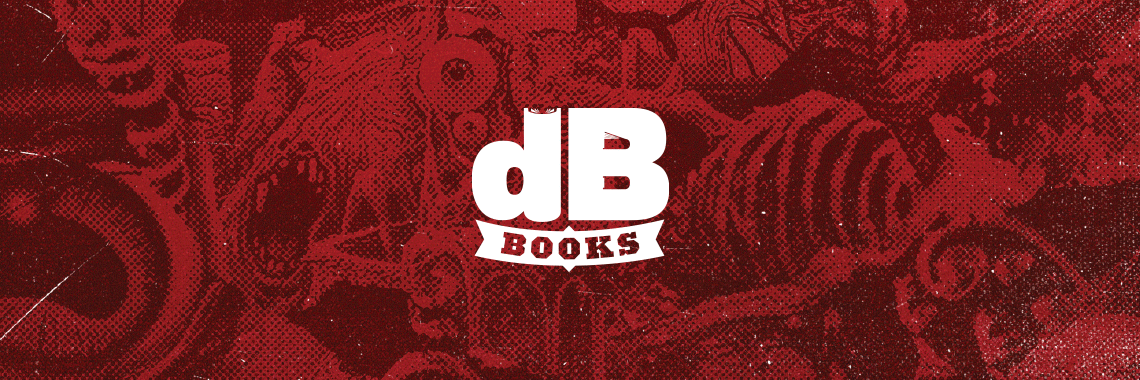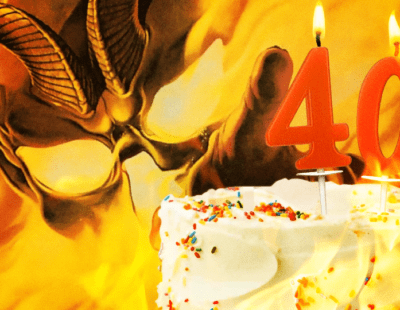
The other day I was rereading the great Robert Ingersoll’s dissertation on the lifework and convictions of Thomas Paine, sub-headed With His Name Left Out, the History of Liberty Cannot be Written, while halfway giving an ear to 20 Reasons to End it All by proto-grind berserkers Heresy (in truth, I was just too lazy to countenance the space stretching between my bed and stereo.) Anyway, the unpremeditated harmony created by Ingersoll’s beautifully patterned polemic on the hegemonic Church/State monolith entwined with Heresy’s blustery, from-the-hip outrage proved wildly befitting, with Heresy imbuing a note of bloodied urgency into the former and Ingersoll furnishing the latter with a super-uncharacteristic élan of acumen and poise.
I began to think about the utility of heresy not only from the Church’s perspective but also from that of the heretic’s; the flint to tinder betrothal of the two. As a device of the Parrish, allegations of blasphemy quite obviously function like shears on a bird’s primary feathers; it’s a tool used to domesticate the spirit, (not to mention for generating mad paper.) And this led me to mull over one of my favorite Biblical yarns from the book of Joshua. As the story goes, during the Israelite’s ruthless campaign to secure their ‘promised land’ they struck an accord with a local tribe by the name of Gibeon. In retaliation for making a pact with Joshua’s invading army, five native hill-tribes, (collectively referred to as the Amonites,) laid siege to the city of Gibeon triggering Joshua’s people to rally to their defense. The Israelites are able to repulse the invaders and mirroring their Jehova’s bloody-minded petulance resolve to slaughter every soldier before the day’s out, (that’ll show ‘em.) But, as the afternoon wears on, this becomes a clearly unachievable goal with the danger for the Israelites becoming that the surviving armies will be able to regroup under the cover of the night and renew their assault over the following day. The answer? Oh, so incredibly simple, my friends! Joshua commanded the sun to remain fixed in the sky until the slaughter could be fulfilled to his personal satisfaction. Easy-peasy, sermon-squeezie, am I right? How long did the sun maintain its position? The bible flippantly suggests for, “…about a day,” as if tendering a guess as to how long it’d take to binge watch two consecutive seasons of House of Cards. But consider the ramifications of such a happenstance, (they’re quite literally global.) Did the rotation of the earth slow down to achieve the desired effect, shrugging off its tethers to the atmosphere while dramatically intensifying the earth’s ambient temperatures and the impact of centrifugal force? Or did this signify -as Cambridge researchers have recently suggested- an apocryphal account of the first solar eclipse in recorded history? What about Immanuel Velikovsky’s immoderate exercise in world-catastrophism, suggesting that the earth was actually shifted on its axis owing to a near collision and incredibly unfortunate exchange of electromagnetic energy with the planet Venus? Shit, I don’t know, Chief… but such divarication is fucking amazing.
Despite the allure of all those marvelous hypotheticals, that’s arguably not the story’s most pertinent aspect. Instead, it’s the borderline casual bow that finishes the anecdote. You see, what may have been even more remarkable than this glib abuse of the solar cycle was that Joshua didn’t request that the sun remain in its position until further notice—rather—he ordered it to do so. In the course of that action, Joshua not only transfigured natural law but warped religious precedent as well. The New International Version remarks that “There has never been a day like it before or since, a day when the Lord listened to a human being…” (Joshua 10:14) By stating that the Lord ‘listened’ to a human being, we can safely presume that the intended meaning is to carry out the orders of one. Never before that day and never since has such a heresy been indulged and for what? So that the fucking armies of the Amorites could be routed and decimated? (It’s worth noting that the lord of hosts appeared to be in the throes of an especially rare fit of pique that day. At one point, he was pelting ‘large hailstones’ down upon the opposing forces with such vigor that “…more of them died from the hail than were killed by the swords of the Israelites.” What a guy!) Forget about drop tunings, gravity blasts and bullet belts. To induce friggin’ El Shaddai to shrug his shoulders and say in effect, ‘okey-doke Josh, you’re the boss,’ is the utter objectification of power, ladies and gentlemen.
“The God of the Old Testament is arguably the most unpleasant character in all fiction: jealous and proud of it; a petty, unjust, unforgiving control-freak; a vindictive, bloodthirsty ethnic cleanser; a misogynistic, homophobic, racist, infanticidal, genocidal, filicidal, pestilential, megalomaniacal, sadomasochistic, capriciously malevolent bully.” —Richard Dawkins
The concept of heresy would have certainly been familiar to the Israelites, (they were born onto a field of eggshells with the possibility of provoking their sky-aegis into murderous outrage always one careless shift of their weight away,) but the word itself would have meant nothing to them. The word ‘heresy’ comes from the Greek hairen, meaning “to choose,” initially referring more directly to the multiple Christian sects that began to germinate in the immediate wake of Christ, implying that one should certainly choose but choose very, very wisely.
It’s remarkable to note that the true heresy doesn’t reside in the act of genocide or enslavement or in pillage, but rather in a people’s or a person’s ideas simply running counter to those of the imperialistic Church/State. Yet there are also smaller social heresies that serve to ruffle our predetermined orbits; we simply seem to be wound that way. Blasphemy’s nested within the action of someone simply experiencing the world in a manner that’s foreign to us. We don’t require some splendidly liveried potentate to train our ire on the aberrant fellow who expresses any sort of deviance in consciousness; our unuttered social-governor will have their way on behalf of our unsettled temperaments, no sermon needed. The Church after all is just a collage of our collective perversions.
Jesus Christ was successfully convicted of heresy and once again, the heavens skirt a well-deserved audit regarding its role in what’s a clear-cut case of aggravated harassment and murder. The Messiah was obviously set up; this, friends, was an inside job. The restless bailiffs of the Roman court and the heart-wrung fanatics of the tabernacle were handed an unalterable script which built inevitably to one hell of a denouement -the public execution of the blameless divine. And why this arc precisely? To illustrate the point that god adores us despite the destructiveness of our sorry dispositions, (yes, the same god that was casually slaughtering retreating soldiers with hailstones only a few paragraphs back.) Could any metaphor be more grievously muddled than this one? Could the likeness of this god possibly better mirror the faults in our own shitty wiring?
“It is dangerous to be right in matters on which the established authorities are wrong.” —Voltaire
Again, why does the concept of heresy or blasphemy exist? When a subject approaches the throne, they do so out of invitation, never on a whim—one doesn’t just ‘drop in’ on their overseers. And as they enter the hall they’re first picked over by a scrum of security and then are expected to make themselves low before the dais with their hands exposed to the assembly. Do we really genuflect before a monarch as an expression of fealty or of admiration for them? I don’t think so. One kneels because they’re less capable of launching an assault from such a position. The powerful live in terror of their subjects just as the Church has smothered us in its shadow for much the same reason: it’s the great terror of full-throated democracy’s introduction to the celestial as well as to the terrestrial experience. Isn’t this the function of heresy: to cartograph our suggested boundaries and then to test their solidity? If the sun in its familiar arc can be bridled by the mere vindictiveness of man, then what can our creativity, our compassion and our reason set into motion? As a map is constructed out of paper, so are its boundaries. Press a bit harder, friend.
“Progress is born of doubt and inquiry. The Church never doubts, never inquires. To doubt is heresy, to inquire is to admit that you do not know—the Church does neither.” —Robert G. Ingersoll
“If we have no heretics we must invent them, for heresy is essential to health and growth.” —Yevgeny Zamyatin
“So make the connection/ no one’s an exception/ the world begins with me and you.” —Heresy






